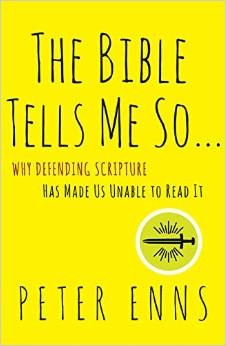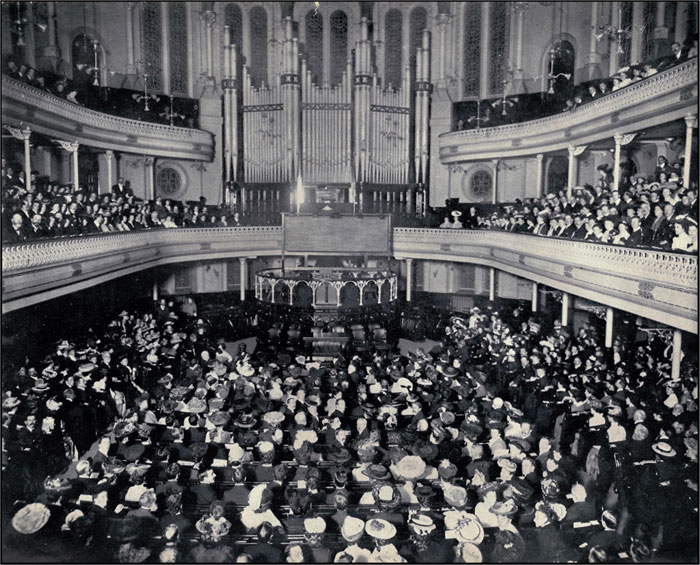Reflections on the Bible
 Peter Enns’ Evolution of Adam was one of my favorite reads of 2013. So I didn’t think twice about tackling his newer book The Bible Tells Me So: Why Defending Scripture Has Made Us Unable to Read It. This one has a similar purpose — recalibrating our expectations of the Bible. But it leaves me with a very different mixture of reactions.
Peter Enns’ Evolution of Adam was one of my favorite reads of 2013. So I didn’t think twice about tackling his newer book The Bible Tells Me So: Why Defending Scripture Has Made Us Unable to Read It. This one has a similar purpose — recalibrating our expectations of the Bible. But it leaves me with a very different mixture of reactions.
Like The Evolution of Adam, The Bible Tells Me So showcases Enns’ considerable knowledge of the Bible and skill with historical criticism. It takes us on a very readable and interesting tour of what we might call the Bible’s human features — and limitations. And it challenges us to think. Enns’ main purpose with this book is to encourage readers to accept the Bible for what it is rather than projecting modern expectations and questions on it or treating it as an instruction manual for life.
What is it, then? An ancient text, one full of truth claims and purporting to be inspired by God (although we don’t hear much about that), even as it’s unavoidably marked and shaped by the historical, culture-bound human minds through whom God inspired it (and we hear a LOT about that).
That sums up my response to this book. It’s strong on supplying evidence of Enns’ thesis about the Bible’s human shaping. But it does little to balance these features against its transcendent qualities. The bulk of the book shows us the contradictions, historical accounts unsupported by archaeology, competing perspectives on God, and rhetorical stretches by its writers. If I didn’t have prior experience with the Bible within the context of my own relationship with God, I would wonder, by the time I got to the end of The Bible Tells Me So, why we should bother to read it at all.
The strange thing is, I agree with Enns in the main when it comes to what kind of book the Bible is. I agree that it bears plenty of human markings, and what’s more, I see this as a strength of the Bible. How God inspired it tells us almost as much about him as what’s on the pages. He is a God willing to humble himself, even to take on human flesh and enter into the limits of space and time — and, in the Bible, into human language and imagination and experience.
Yet despite this basic sympathy, I reached the end of The Bible Tells Me So with some disappointment. It’s probably because I was expecting a different kind of book — much like some people do with the Bible, a point Enns returns to many times. As the subtitle indicates, he feels that excessive defense of the Bible is the last thing it needs, so it’s no wonder that he doesn’t mount one here. Sometimes, I thought that Enns was trying too hard — too many jokes, too much eagerness to point out problems, too much overstatement. (There are, after all, other interpretations out there.) But he provides an honest assessment of a believer’s struggles with the Bible. This will come as a welcome alternative for those who feel they can’t investigate the Bible or get a hearing for their questions.
I’m a Christian, but the book did something for me too. It made me listen from beginning to end to some specific problems with the Bible — without the author kicking into rational defensive mode. It made me uneasy, but this was good in a medicinal kind of way. I guess I have more “defending the Bible” pulsing through my veins than I realized. (Edited to add: Still, his assertions require some defense, whether or not the Bible does. Essentially he proposes that much of the Bible is simply humans misunderstanding of what God is trying to say, but we should read it anyway.)
I didn’t accept or agree with everything, but I really liked a lot of what I read in The Bible Tells Me So. It was unfailingly engaging, and as I scribbled my questions in a notebook while reading, I was reminded that the Bible isn’t the end-all of the Christian faith. Restored relationship with God is. One thing God gains from a Bible inspired in this way is that it repels our tendency to bibliolatry. We aren’t meant to be Bible-worshipers, and this Bible invites too much struggle and debate to become a passive idol. It invites us to read and study, it stirs up confusion alongside the wisdom and reassurance and instruction, and in our best moments we take our questions to God.
All this talk, and I still haven’t offered a single quotation. I’ll give Peter Enns the last word:
The Bible is God’s Word. The Bible has been around a long time and it’s not going anywhere. Even with all its challenges and odd stories, its naysayers and skeptics, it’s got staying power. People just keep right along meeting God there.
Forget everything else. Forget all the reasons we might have for putting it away in a box somewhere with other ancient relics. Forget the fact that God often has a temper and commands strange things. Forget the fact that its writers thought the earth was flat, a flood covered the earth, or the first woman held a conversation with a snake.
The Bible, just as it is, still works.
Don’t try to explain it. Just accept it. That won’t make you a mindless zombie. It just means you are accepting your own human limitations and acknowledging by faith something bigger than ourselves is happening, someone bigger is behind it, and we have the privilege to be a part of it.
Hold on to the time-tested wisdom that in order to know God better, we should keep reading and wrestling with the Bible. It’s God’s Word and that’s what he wants.
Edited to add: Afterthoughts here.



4 Comments
Debd
It sounds like an interesting mix. I wonder; is his audience is mostly Protestants? Defending the Bible is not something that Orthodox (and suspect Catholics) spend a lot of time doing…so I guess his main audience would be Protestants. I would think that the natural progression of Sola Scriptura is to defend the Bible since it is considered the sole source for Protestant practice and doctrine. Does he touch on this at all? It seems to me that SS is the tiny tear in the Protestant fabric that leads to gaping holes… but then again, my opinion is biased ;)
Janet
Enns makes the point that the Bible “is not, never has been, and never will be the Center of the Christian faith… That position belongs to God, specifically, what God has done in and through Jesus. The Bible is the church’s non-negotiable partner, but it is not God’s final word: Jesus is.”
I’m not sure the audience is Protestant — I think the audience for this book is pretty broad. Some of the extremes he seeks to temper come out of evangelicalism, but I think he is speaking mainly to people who have been alienated from Christianity — or never gotten close enough to evaluate — because they’ve not gotten a hearing for their questions.
Debd
Great quote… I think it is a good one for many evangelicals to hear… albeit a hard one.
Janet
I have no problem with the idea that the Bible isn’t God’s only revelation. But I think the author is careless in the way he makes his argument. I much preferred ‘The Evolution of Adam,’ to my mind a far better book — more complete, more qualified, and more kind (as you say, some things need to be said with gentleness).
I realize this is a stronger negative statement than I made in my review! — sometimes it takes a few days for a book to sink in.